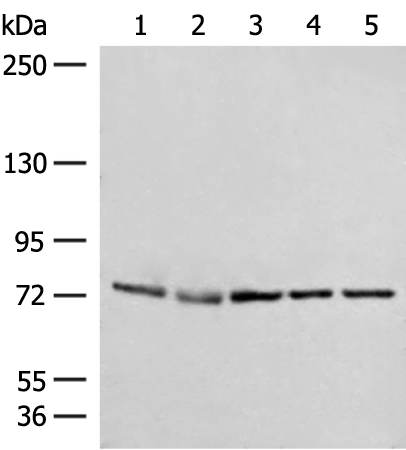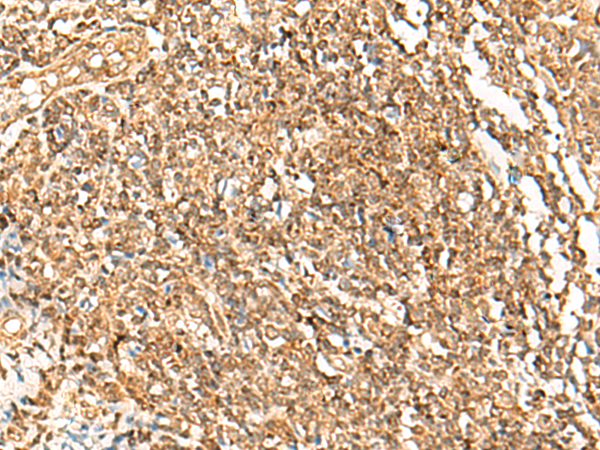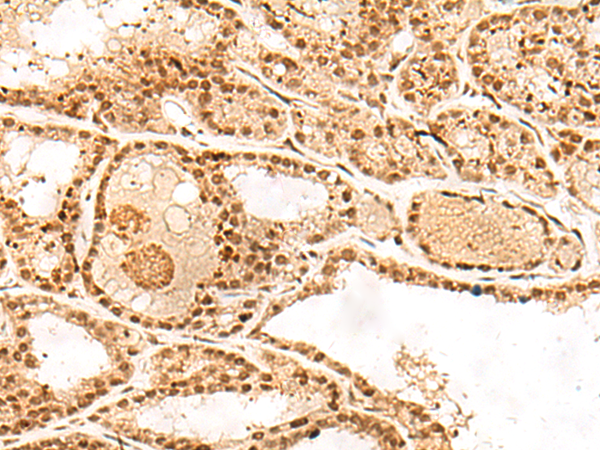


| WB | 咨询技术 | Human,Mouse,Rat |
| IF | 咨询技术 | Human,Mouse,Rat |
| IHC | 1/50-1/300 | Human,Mouse,Rat |
| ICC | 技术咨询 | Human,Mouse,Rat |
| FCM | 咨询技术 | Human,Mouse,Rat |
| Elisa | 1/5000-1/10000 | Human,Mouse,Rat |
| Aliases | XPV; XP-V; RAD30; RAD30A |
| WB Predicted band size | 78 kDa |
| Host/Isotype | Rabbit IgG |
| Antibody Type | Primary antibody |
| Storage | Store at 4°C short term. Aliquot and store at -20°C long term. Avoid freeze/thaw cycles. |
| Species Reactivity | Human, Mouse |
| Immunogen | Fusion protein of human POLH |
| Formulation | Purified antibody in PBS with 0.05% sodium azide and 50% glycerol. |
+ +
以下是3-4条关于 **POLH抗体** 的参考文献及其摘要概括:
---
1. **文献名称**:*DNA polymerase η function and antibody applications in somatic hypermutation*
**作者**:Masutani, C., et al.
**摘要**:该研究阐明了POLH(DNA聚合酶η)在跨损伤DNA合成(TLS)中的关键作用,并开发了特异性抗体用于检测其在B细胞中的表达,揭示了其在体细胞超突变中的调控机制。
2. **文献名称**:*Deficiency of POLH in xeroderma pigmentosum patients correlates with antibody-based detection loss*
**作者**:Johnson, R.E., et al.
**摘要**:通过POLH特异性抗体分析着色性干皮病(XPV)患者细胞,发现POLH蛋白表达缺失或功能异常,导致紫外线诱导的DNA损伤修复缺陷,验证了抗体在临床诊断中的应用潜力。
3. **文献名称**:*High-throughput screening of POLH inhibitors using monoclonal antibody-based assays*
**作者**:Bianchi, J.J., et al.
**摘要**:研究利用抗POLH单克隆抗体建立高通量筛选平台,筛选小分子抑制剂以阻断POLH介导的跨损伤合成,为癌症治疗中增强化疗敏感性提供了新策略。
4. **文献名称**:*Structural and functional characterization of POLH antibodies for targeted cancer therapy*
**作者**:Bauer, J., et al.
**摘要**:通过解析POLH抗原表位并开发功能性抗体,研究证实抗体可特异性靶向肿瘤细胞中高表达的POLH蛋白,为开发基于抗体-药物偶联物(ADC)的精准疗法奠定基础。
---
以上文献摘要均围绕POLH抗体的功能研究、疾病关联或治疗应用展开。如需具体文献链接或扩展内容,可进一步补充信息。
POLH antibody targets the POLH protein, also known as DNA polymerase eta (Pol η), a specialized enzyme involved in DNA damage repair. Belonging to the Y-family of translesion synthesis (TLS) polymerases, POLH facilitates error-prone replication across ultraviolet (UV)-induced DNA lesions, such as cyclobutane pyrimidine dimers (CPDs), which distort the DNA helix. This bypass mechanism, termed error-prone repair, allows cells to tolerate damage and continue replication, albeit with a higher mutation risk. POLH mutations are linked to xeroderma pigmentosum variant (XP-V), a condition characterized by extreme UV sensitivity and heightened skin cancer susceptibility due to defective TLS.
POLH antibodies are essential tools in studying DNA repair mechanisms, protein interactions, and POLH expression patterns in normal versus cancerous tissues. They enable detection via techniques like Western blot, immunohistochemistry (IHC), and immunofluorescence (IF), aiding research on POLH's role in replication stress responses, chemotherapy resistance, and mutagenesis. These antibodies also help assess POLH dysfunction in XP-V diagnostics and explore therapeutic strategies targeting TLS pathways in oncology.
×